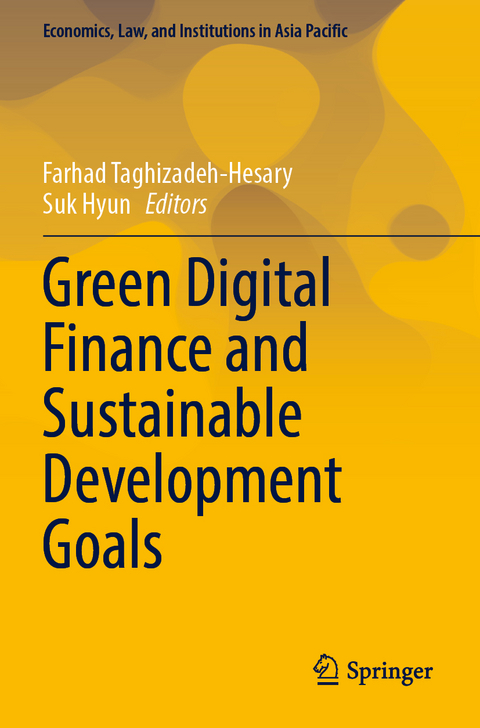
Green Digital Finance and Sustainable Development Goals
Springer Verlag, Singapore
978-981-19-2664-8 (ISBN)
This book aims to fill the literature gap on digital instruments and FinTech in enhancing green finance. Technological innovation can increase transparency, accountability, and speed, decentralize the financial system, improve risk management, increase competition, lower costs, improve efficiency, increase cross-sectoral collaboration and integration, and scale up green finance. Artificial intelligence (AI), distributed ledger technologies (DLT) or blockchain, peer-to-peer lending platforms, big data, Internet-based and mobile-based payment platforms, Internet of Things (IoT), matchmaking platforms including crowdlending, tokenizing green assets are potential means to scale up the green finance for achieving the SDGs.
The COVID-19 pandemic, the economic downturns, and the uncertainties shrank the new investments in renewable energy projects globally. Low investment in renewable energy projects could threaten the expansion of green energy needed to provide energy security and meet SDG7 and SDG13. Investments in renewable energy projects are scarce because of several risks and a low rate of return. Although several new green financing solutions such as green bonds, green banks, green credit guarantee, carbon taxation, carbon trade, village funds, and community trust funds have been established in different countries, these are insufficient, and alternative ways to finance projects are required. The book provides several high-quality studies on utilizing digitalization, FinTech, financial innovations, and other new technologies to fill the finance gap of green projects to meet the SDG goals. The chapters are written by scholars in diverse countries and regions and include practical policy recommendations.
Dr. Farhad Taghizadeh-Hesary is an associate professor of economics at Tokai University in Japan and a visiting professor at Keio University in Tokyo, Japan. He has taught as an assistant professor at Keio University and Waseda University, Tokyo. He is a recipient of the Excellent Young Researcher status from the Ministry of Education, Culture, Sports, Science, and Technology of Japan (MEXT). He is also a visiting professor at Technology Studies Institute (Iran), Chiang Mai University (Thailand), and a distinguished research fellow at the University of Economics, Ho Chi Minh City (Vietnam). Currently, he serves as the editor-in-chief of the Journal of Environmental Assessment Policy and Management and as an associate editor/board member of several other journals, including Singapore Economic Review, Global Finance Journal, Economic Change and Restructuring, and Energy Efficiency. He has guest-edited special issues for several journals, including Energy Policy, Energy Economics, Finance Research Letters, Economic Analysis and Policy, Journal of Environmental Management, Climate Change Economics, Resources Policy, and Renewable Energy. His research credits include authoring more than 250 academic journal papers and book chapters and editing 15 books, published by Springer Nature, Routledge, World Scientific, and Asian Development Bank Institute. Dr. Taghizadeh-Hesary holds a Ph.D. in economics from Keio University, with a scholarship from the Government of Japan (MEXT). Dr. Suk Hyun is the dean of EastAsia International College (EIC) and the head professor of the Graduate School of Environmental Finance, Yonsei University. Prior to joining EIC in 2018, he was a visiting scholar in the Department of Economics, University of Southern California, anda research fellow at Korea Capital Market Institute (KCMI). He worked as an economist at the Bank of Korea during 2009–2010 and spent three years (2006–2009) in Japan as a bond market specialist in charge of the Asian Bond Markets Initiative (ABMI) Task Force at the Japan Bank for International Cooperation (JBIC). His expertise is in international finance, bond markets, and the Japanese economy, with recent research covering infrastructure bonds, green bonds, capital market development, and financial integration in Asia. He has a bachelor’s degree in economics from Yonsei University and earned his master’s and Ph.D. degrees in economics from Keio University.
lt;p>
| Erscheinungsdatum | 04.07.2023 |
|---|---|
| Reihe/Serie | Economics, Law, and Institutions in Asia Pacific |
| Zusatzinfo | 40 Illustrations, color; 5 Illustrations, black and white; XVI, 366 p. 45 illus., 40 illus. in color. |
| Verlagsort | Singapore |
| Sprache | englisch |
| Maße | 155 x 235 mm |
| Themenwelt | Naturwissenschaften ► Biologie ► Ökologie / Naturschutz |
| Wirtschaft ► Betriebswirtschaft / Management ► Finanzierung | |
| Wirtschaft ► Volkswirtschaftslehre | |
| Schlagworte | Blockchain • distributed ledger technologies • FinTech • Green Digital Finance • Green finance • SDG13 • SDG7 |
| ISBN-10 | 981-19-2664-6 / 9811926646 |
| ISBN-13 | 978-981-19-2664-8 / 9789811926648 |
| Zustand | Neuware |
| Haben Sie eine Frage zum Produkt? |
aus dem Bereich


